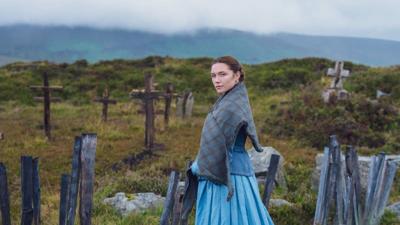A worthy companion piece to the recent “She Said” and upcoming “Women Talking,” Sebastian Lelio’s “The Wonder” is a powerful social screed that doesn’t suffer from a shortage of ambition.
Initially, the plot appears to be an examination of faith being questioned in the face of science. However, as it unfolds, the film reveals itself to be a broadside aimed at patriarchal societies as well as a portrait of the women trapped in a world only interested in oppressing or abusing them.
Set in Ireland in 1862, English nurse Elizabeth “Lib” Wright (Florence Pugh) has traveled a great distance, having accepted a mysterious job offer, the details of which she receives when she arrives. Hired by a group of town elders — among them a priest (Ciaran Hinds) and a doctor (Toby Jones) — she’s to live with the O’Donnell family for two weeks and observe their 11-year-old daughter, Anna (Kila Lord Cassidy).
They claim that she hasn’t eaten in four months. Neither the local clergy nor doctor can disprove this. A nun has also been assigned to watch Anna when Lib is not present.
Word has spread about the miracle that may be in their midst, drawing the attention of unwanted outsiders as well as the press, with reporter Will Byrne (Tom Burke) poking around to discredit these reports. He and Lib become uneasy allies in this investigation, a romance developing between them rooted more in availability than passion.
Lib’s outsider status is essential. The elders’ desire to appear impartial has prompted them to bring in someone with no vested interest in this situation, though they themselves are uncertain as to how they hope this will be resolved. Would notice from the outside benefit their town, perhaps through commerce? Or would it bring unwanted attention that could undermine the power structure they cling to?
As Lib begins to unravel the mystery, she realizes how desperate the situation is for Anna, her family, and ultimately, herself. The script by Alice Birch and Leilo is based on the novel by Emma Donoghue, the author of “Room.” Like that story, this too deals with confinement, as the constraints this society puts on their women are suffocating. Lib, having tended to the wounded during the Crimean War, is unique in her circumstances. Having seen that a world exists outside the town of her birth, she’s more aware of what she and her brethren are capable of, as well as what they deserve.
Obviously, her ideals clash with the O’Donnells and their peers, a conflict that drives the third act. Leilo takes a deliberate approach telling this story, but the viewers’ patience is ultimately rewarded with a thought-provoking conclusion.
The compromises and sacrifices characters undertake prove surprising and poignant. The only flaw is an awkward framing device that begins and ends the movie on the soundstage in which some of its scenes were shot. Breaking the fourth wall, actress Niamh Algar, who plays Anna’s elder sister, Kitty, and serves as the narrator, informs us that the film’s characters believe in the stories they tell and pops up again midway through the film to remind us of this. Obvious and inexplicable, this method only distracts and confuses.
The conclusion proves bittersweet, as the decisions Lib has made seem practical in the moment but don’t offer any true or permanent salvation. The search for what will sustain her and other women — both physically and spiritually — is not promised, and when attained, will always be hard won.
In the end, “The Wonder” reminds us that resiliency and reinvention are still needed for women to gain the agency and recognition they deserve. That they must continue in this struggle is to our shame.













